Dispatches From Cairo: Of Presidents and Pharaohs
Results showed a clear majority for Mohamed Morsi, the Muslim Brotherhood candidate, over regime candidate Ahmed Shafiq. But watch out for flames shooting from the military dragon.Results showed a clear majority for the Muslim Brotherhood candidate, but watch out for flames shooting from the military dragon.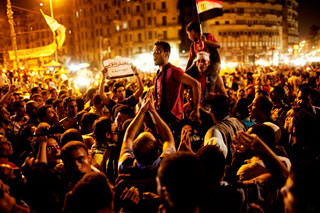
CAIRO — Surprise. Surprise. Once again Egypt has proved to be unpredictable.
Though the official announcement of the winner in the presidential election isn’t due until later this week, results on Monday showed a clear majority for Mohamed Morsi, the Muslim Brotherhood candidate, over regime candidate Ahmed Shafiq. But watch out for flames shooting from the military dragon.
In the hours since the closing of the polls Sunday night, a new constitutional decree was instituted by the Supreme Council for the Armed Forces, giving legislative authority and constitution-writing power to the generals and thereby drastically reducing presidential power. It obviously was a regime move against an opposition victory in the race for the presidency.
The SCAF has been the de facto ruling body since Hosni Mubarak’s ouster in February 2011. The new constitutional change tightens its grasp on power in the face of a possible handover of the reins to a civilian, giving the military control of all laws and the national budget, immunity from prosecution, and the authority to veto any declaration of war (which many in the West will see as a good thing in light of the Muslim Brotherhood’s hard stance against Israel and its stated intention to seek dissolution of the 32-year-old Camp David peace treaty with that nation).
Further confusing the situation is the fact that the election outcome may be revoked by authorities until the end of the month, at which time an elected civilian government is supposed to take control. This gives the SCAF time to readjust its tactics.
In the last week, Egypt has been on a regime-driven roller coaster, experiencing the dissolution of Parliament, the reinstatement of martial law, a declaration of a constitutional change that further empowers the military, and what appears to be Morsi’s election as president, which has yet to be confirmed by a regime-controlled committee. Already the expected rumors of illegalities in the Morsi campaign are circulating. Egypt is left facing a broad range of possibilities.
After dissolving the Islamist-majority Parliament and the constitution-writing committee last week, the SCAF acted quickly to assemble its own 100-member constitution-drafting panel, people who presumably know how to create a constitution that will satisfy the military.
Saad Katatni, the Muslim Brotherhood head of the disbanded Parliament, insisted that the military had no authority to dissolve the legislature or write a constitution. He claimed that Parliament had chosen its own 100-member panel and had already begun meetings to draft a constitution. In effect, this creates a competing legislative assembly.
With soldiers and riot police officers barring the way, Parliament members have been kept out of the Parliament building, and the lockout will continue Tuesday morning. Saad Hussainy, the leader of the Brotherhood’s parliamentary bloc, said the group’s MPs would show up at the Parliament as scheduled Tuesday morning. The probability of a street confrontation is high.
“Down, down with military rule!” supporters at Morsi’s campaign headquarters cried before his victory speech Monday afternoon. “I thank Allah,” Morsi said, “for guiding Egypt to this straight path, the path of freedom and democracy.” He promised to represent all Egyptians, including the nation’s Coptic Christian minority and those who had rallied against him. Many of those who opposed him were motivated by fear of a Brotherhood-directed government.
Egypt’s Sufis — members of Islam’s mystical branch, rejected by the fundamentalists — were among the strong backers of Shafiq. This support was bolstered in the days before the election by another burning of a Sufi shrine.
On Sunday, to the sound of military helicopters circling over Cairo in a demonstration of the regime’s presence and power, I and some companions accompanied the elderly mother of one of us to a polling station for aged voters. She greeted many there, most leaning on canes, and joked “Power to the canes!” causing them to laugh. She went in to happily color her little finger with purple ink. She is an adherent of a strain of Islam that differs with the Muslim Brotherhood, and she voted for Shafiq.
In reaction to the closure of the Parliament, Egypt’s Islamists and democrats alike were demoralized and supporters of the military regime’s candidate were initially energized. However, the sudden realization that the revolution so dearly paid for could end in a return to a military police state prompted even many of those who detested the Brotherhood to vote for its Mohamed Morsi over the military’s Gen. Ahmed Shafiq.
Liberals are afraid of the notion of a Muslim Brotherhood covert international Islamic agenda and the risk of loss of their personal, moral and religious freedom. Artists, musicians, writers, filmmakers, intellectuals and others were torn between betraying the revolution and the prospect of being forbidden freedom of expression under Islamist government-enforced Shariah law. Some simply did not believe that a vote for Morsi would actually count.
“It was just that I could not bear to think of what we went through, the martyrs who died to free us of this regime, and then to vote for it to come back,” Amira, an actress and activist, told me. But she was in shock when the vote count showed Morsi had won. “I want to cut my hand off,” she said.
Others — fearing loss of freedom, perhaps Egypt becoming Islamized like Saudi Arabia or Iran — either disqualified their votes by writing in “The martyrs” in protest or they voted for Shafiq.That Morsi would be as equitable, fair and open-minded as he claimed in his passionate victory speeches cannot be ruled out. But he will have to compromise with the SCAF, as he is already accused of doing, in order not to be eliminated in one way or another. He will also have to combat most of the world’s deep distrust of the tentacular and historically aggressive Muslim Brotherhood, from which he had promised to resign immediately if elected. (Since the voting he has yet to refer to the vow.)
Alarm over the rise of the Muslim Brotherhood makes some observers of the “Arab Spring” tremble, from the United States to Pakistan. Reports of international offers from Muslim Brotherhood powers in other countries to back up a Morsi presidency may or may not be true. Social networks are abuzz with fear-producing but possibly irrelevant assertions, including that some terrorist groups such as al-Qaida have historical and ideological affiliations with the Egyptian Muslim Brotherhood and that Osama bin Laden’s top deputy, Ayman al-Zawahiri, was once a member of the Egyptian Muslim Brotherhood.
But such considerations aside, the giant, unwieldy Arab Republic of Egypt, the “Mother of the Nile,” the “heart of the Arab world,” remains the example for the entire Arab and Islamic world. The U.S. administration must be very careful about pushing Egypt one way or the other.
When U.S. Secretary of State Hillary Clinton announced renewed funding of Egypt’s military in March, there was an outcry on Capitol Hill that this decision removed pressure on Egypt’s military rulers to follow through on their promise to relinquish power to a democratically elected civilian government.
Money is only part of the agreement between Washington and Cairo to guarantee Egypt’s peace with Israel. There is a history of militaristic cooperation between the U.S. and Egypt, with arms being supplied by Washington and Egyptian military officers going to the U.S. to train, and that has created a strong attachment between the leaderships of the two countries.
Over the weekend there were numerous, unconfirmed reports in Egyptian media of increased activity among Palestinian terrorists in the Sinai Peninsula and of Israeli tanks nearing the border in defiance of Jerusalem’s peace treaty with Cairo. To many observers, the reports were seen as evidence that heating up the fear of military threat was in someone’s interest.
Egypt’s security forces are likely to be busy quelling protests in coming days, while stumped and dismissed legislators try to untangle the creative legal mechanisms invented to justify the generals’ authority. The outcome will be a face-off between the two huge camps of power. Neither one of these camps represents the will of Egypt’s majority, which originally voted for candidates other than Shafiq and Morsi.
In an interview with Al-Jazeera, Sameh Ashour, the head of the advising council for the SCAF, said, “The upcoming president will occupy the office for a short period of time, whether or not he agrees. His office term will be short despite the huge efforts exerted in the election campaigns because a new constitution will be drafted, followed by new parliamentary elections to take on the legislative power; and therefore it is not possible in any event for the president to remain in office after a new constitution comes to the light.”
Mohamed Abou-Treika, Egypt’s most prominent football star and a Brotherhood supporter, refused to have his photo taken with a Shafiq delegate in a polling station and chose instead to be photographed alone wearing a T-shirt emblazoned with the words: “The day I give up your rights, I’ll surely be dead.”
Coincidentally, Monday was the anniversary of the declaration of the Egyptian republic, on June 18, 1953.
Your support matters…Independent journalism is under threat and overshadowed by heavily funded mainstream media.
You can help level the playing field. Become a member.
Your tax-deductible contribution keeps us digging beneath the headlines to give you thought-provoking, investigative reporting and analysis that unearths what's really happening- without compromise.
Give today to support our courageous, independent journalists.
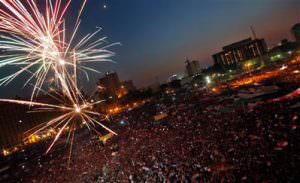
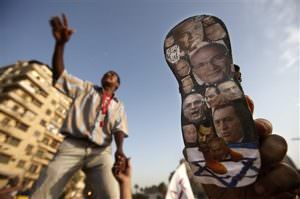
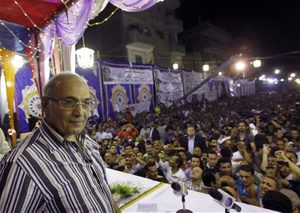
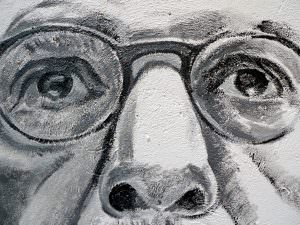

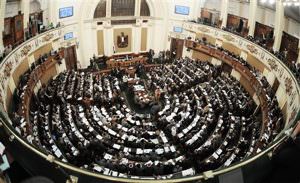


You need to be a supporter to comment.
There are currently no responses to this article.
Be the first to respond.